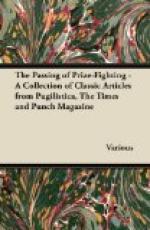Being in Brummagem (as it has been wittily called), the Punch man bethought him of the Rev. R.J. CAMPBELL, once the very darling of the new gods—in fact the arch neo-theologian. But Mr. CAMPBELL, erstwhile so articulate and confident, had nothing to say. All he could do was to lock himself for safety in his church and look through the keyhole with his beautiful troubled wistful orbs.
Mr. G.K. CHESTERTON loomed up to a dizzy height amid a cloud of new witnesses. Greeting the Punch man, he laid aside his proofs.
“I was just deleting the abusive epithet ‘Lloyd’ from all the references to the PREMIER,” he said, “but I have a moment for you. I find a moment sufficient time for the assumption of any conviction however lifelong.”
The Punch man asked if he had read the Dunmow evangel.
“I have read Mr. WELLS’S book, God, the Invisible Man, with the greatest interest,” said Mr. CHESTERTON.
The Punch man ventured to correct him. “God, the Invisible King,” he interposed.
“Very likely,” replied the anti-Marconi Colossus. “But what’s in a title anyway? Books should not have titles at all, but be numbered, like a composer’s operas, Op. 1, Op. 2, and so on.”
“Whether or not the opping comes, some of them,” said the Punch man, “are certain to be skipped.”
The giant was visibly annoyed. “You’re not playing the game,” he said. “It’s I who ought to have said that. Not you. You’re only the interviewer. You’d better give it to me anyway.”
“And what,” the Punch man asked, “are your views respecting God?”
“I consider,” he said instantly, “that an honest god’s the noblest work of man.”
“I felt sure you would,” the Punch man replied. “In fact, I had a bet on it.”
The Rev. Sir WILLIAM ROBERTSON NICOLL, Editor of The British Weekly, said that for many years his paper had supported Providence, to, he believed, their mutual advantage, and it would continue to do so. He personally recognised no need for change. Still, no one welcomed honest analysis more warmly than himself, and he had read Mr. WELLS’S masterpiece with all his habitual avidity and delight.
The Punch man, passing on to the office of The Times, craved permission to see the Editor, through smoked glass if necessary. Having complied with a thousand formalities he was at last ushered into the presence. The great man was engaged in selecting the various types in which to-morrow’s letters were to be set up—big for the whales and minion for the minnows. “I can give you just two minutes,” he said, without looking up. “These are strenuous ti——, I should say days. Self-advertisement we leave to the lower branches of the family.”
“All I want to know,” said the Punch man, “is what is your idea of God? The feeling is very general that God should be more clearly defined and, if possible, personified. One of your own Republican correspondents, who not only got large type but a nasty leader, has said so. How do you yourself view Him?”




